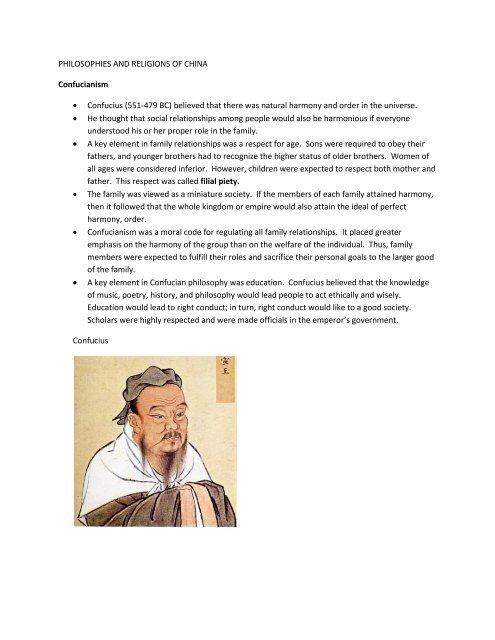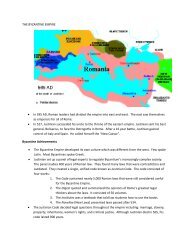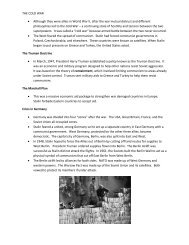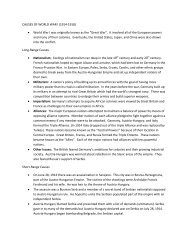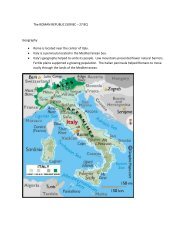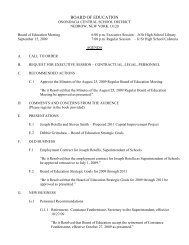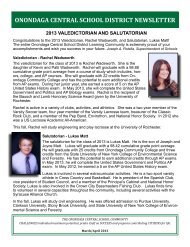File philosophies and religions of china.pdf
File philosophies and religions of china.pdf
File philosophies and religions of china.pdf
You also want an ePaper? Increase the reach of your titles
YUMPU automatically turns print PDFs into web optimized ePapers that Google loves.
PHILOSOPHIES AND RELIGIONS OF CHINAConfucianismConfucius (551-479 BC) believed that there was natural harmony <strong>and</strong> order in the universe.He thought that social relationships among people would also be harmonious if everyoneunderstood his or her proper role in the family.A key element in family relationships was a respect for age. Sons were required to obey theirfathers, <strong>and</strong> younger brothers had to recognize the higher status <strong>of</strong> older brothers. Women <strong>of</strong>all ages were considered inferior. However, children were expected to respect both mother <strong>and</strong>father. This respect was called filial piety.The family was viewed as a miniature society. If the members <strong>of</strong> each family attained harmony,then it followed that the whole kingdom or empire would also attain the ideal <strong>of</strong> perfectharmony, order.Confucianism was a moral code for regulating all family relationships. It placed greateremphasis on the harmony <strong>of</strong> the group than on the welfare <strong>of</strong> the individual. Thus, familymembers were expected to fulfill their roles <strong>and</strong> sacrifice their personal goals to the larger good<strong>of</strong> the family.A key element in Confucian philosophy was education. Confucius believed that the knowledge<strong>of</strong> music, poetry, history, <strong>and</strong> philosophy would lead people to act ethically <strong>and</strong> wisely.Education would lead to right conduct; in turn, right conduct would like to a good society.Scholars were highly respected <strong>and</strong> were made <strong>of</strong>ficials in the emperor’s government.Confucius
Taoism (Daoism)According to the religion <strong>of</strong> Taoism, people should learn from nature how to behave <strong>and</strong>think. For example, by observing the ways <strong>of</strong> a spring breeze or running brook, people couldput themselves in touch with a divine force. They would learn to behave in a simple <strong>and</strong>natural way rather than strive to follow formal rules <strong>and</strong> obligations <strong>of</strong> society. Living apartfrom society, Taoists hoped to achieve inner peace <strong>and</strong> harmony by acting in accordancewith the ways <strong>of</strong> nature. Lao Zi was the founder <strong>of</strong> this religion.LegalismBuddhismLegalism shaped China’s early history.Han Feizi was the most famous legalist writer. He believed that people were selfish <strong>and</strong>acted out <strong>of</strong> self interest.He rejected Confucian ideas about proper behavior. He believed people would respond torewards <strong>and</strong> punishment. Legalists believed only harsh rulers with strong laws could impose order on society. In 221BC, the Qin emperor Shi Huangdi used Legalism to unite China.Buddhism was a different religion for the Chinese. Confucianism, Taosim, <strong>and</strong> Legalism, gaveguidelines for living on earth.Buddhism also gave moral guidelines but the ultimate state <strong>of</strong> being, nirvana, was not earthly.Eventually, Buddhism blended with other <strong>philosophies</strong> to reflect Chinese values.Yin <strong>and</strong> YangYin <strong>and</strong> Yang are opposite forces <strong>of</strong> nature that balance each other. All Chinese <strong>philosophies</strong>follow this concept.


